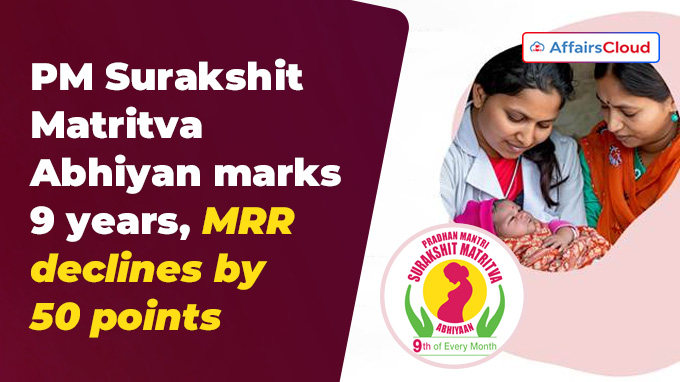 In June 2025, the Pradhan Mantri Surakshit Matritva Abhiyan (PMSMA), a flagship initiative of the Ministry of Health and Family Welfare (MoHFW), Government of India (GoI), marks its 9th anniversary. The aim of PMSMA is to reduce maternal and neonatal mortality by facilitating early detection and prompt management of high-risk pregnancies.
In June 2025, the Pradhan Mantri Surakshit Matritva Abhiyan (PMSMA), a flagship initiative of the Ministry of Health and Family Welfare (MoHFW), Government of India (GoI), marks its 9th anniversary. The aim of PMSMA is to reduce maternal and neonatal mortality by facilitating early detection and prompt management of high-risk pregnancies.
- As of May 2025, over 6.19 crore pregnant women have received antenatal check-ups under the PMSMA across India.
- India’s Maternal Mortality Ratio (MMR) declined by 50 points, from 130 per 100,000 live births during 2014–2016 to 80 per 100,000 live births during 2021–2023, indicating significant progress in maternal healthcare outcomes.
Note: The MMR is a key indicator of maternal health, representing the number of maternal deaths per 100,000 live births.
About Pradhan Mantri Surakshit Matritva Abhiyan (PMSMA):
The scheme,launched in June 2016, was designed to provide assured, comprehensive, and quality Antenatal Care (ANC) services free of cost to all pregnant women on the 9th of every month, particularly during the second and third trimesters.
- It aligns with the overarching objectives of the Reproductive, Maternal, Newborn, Child, and Adolescent Health plus Nutrition (RMNCAH+N) strategy implemented under the National Health Mission (NHM).
- The programme adopts a structured approach to private sector engagement by encouraging private practitioners to volunteer for the campaign, assist in formulating awareness strategies, and actively participate in service delivery at government health facilities under the Abhiyan.
Objectives:
i.Improve the quality of care during antenatal visits.
ii.Identifying and managing High-Risk Pregnancies (HRP) at an early stage.
iii.Appropriate birth planning and complication readiness for each pregnant woman.
iv.Ensuring appropriate management of women with malnutrition.
Key Features:
i.A minimum package of antenatal care services would be provided to the beneficiaries on the 9th day of every month at identified public health facilities in both urban and rural areas, in addition to the routine ANC.
ii.A sticker indicating the condition and risk factor of the pregnant women would be added onto Mother and Child Protection (MCP) card for each visit:
- Green Sticker indicating women with no risk factor.
- Red Sticker indicating women with high risk pregnancy.
Extended PMSMA (E-PMSMA):
i.The E-PMSMA was rolled out in January 2022 to ensure continuous tracking and follow-up of HRP women until safe delivery by providing financial incentives to both the identified HRP women and their accompanying Accredited Social Health Activists (ASHA) for making three additional antenatal visits beyond the regular PMSMA check-up.
ii.As of December 31, 2024, more than 78.27 lakhs HRP women have been identified across all States/Union Territory(UTs).
Key features of E-PMSMA:
i.Name-based line listing of HRP women.
Up to four additional PMSMA sessions per month for focused care.
ii.Individual tracking of HRP cases until a healthy outcome, extending up to 45 days post-delivery.
iii.Short Message Service(SMS) alerts sent to both the beneficiary and the ASHA for registration and follow-up.
Integration with National Health Policies:
PMSMA complements other existing programs of the government like:
i.Janani Suraksha Yojana (JSY):
- It was launched in April 2005 to incentivize institutional deliveries through conditional cash transfers.
- This scheme has benefitted over 11.07 crore women as of March 2025.
ii.Janani Shishu Suraksha Karyakram (JSSK):
- Launched to promote free institutional delivery and neonatal care.
- More than 16.60 crore beneficiaries have been served since 2014–15.
iii.Labour Room Quality Improvement Initiative (LaQshya):
- It was launched in December 2017 for improving quality of care in labour rooms.
iv.Surakshit Matritva Aashwasan (SUMAN):
- SUMAN was launched in 2019 to strengthen respectful and quality care for pregnant women.
- 90,015 SUMAN health facilities have been notified across the country by March 2025.
v.POSHAN Abhiyaan:
- POSHAN Abhiyaan, or National Nutrition Mission, was launched in March 2018 to target the most vulnerable children, adolescent girls, pregnant women, and lactating mothers by revamping the nutrition services.
- As of present, there are 6.97 crore Poshan Pakhwadas across India.
vi.Pradhan Mantri Matru Vandana Yojana (PMMVY):
- Launched in 2010 to promote institutional delivery and ensure maternal health, the scheme provides direct cash benefits of Rs. 5,000 to pregnant and lactating women.
Achievements:
i.The number of private practitioners registered as volunteers for the programme stands at 6,813 and number of facilities providing PMSMA services are 20,752.
Top 5 states (In terms of volunteer registered till May 2025)
| S.no. | States | Number |
|---|---|---|
| 1 | Maharashtra | 1131 |
| 2 | Uttar Pradesh, UP | 1076 |
| 3 | Rajasthan | 1015 |
| 4 | Madhya Pradesh, MP | 927 |
| 5 | Karnataka | 615 |
Top 5 states (In terms of number of pregnant women received ANC)
| S.no. | States | Number |
|---|---|---|
| 1 | Uttar Pradesh, UP | 1,89,534 |
| 2 | Madhya Pradesh, MP | 38,573 |
| 3 | Andhra Pradesh, AP | 36,216 |
| 4 | Gujarat | 24,039 |
| 5 | West Bengal, WB | 23,102 |
About Ministry of Health and Family Welfare (MoHFW):
Union Minister – Jagat Prakash Nadda (Rajya Sabha – Gujarat)
Minister of State (MoS) – Prataprao Ganpatrao Jadhav (Buldhana, Maharashtra); Anupriya Patel (Mirzapur, Uttar Pradesh, UP)




